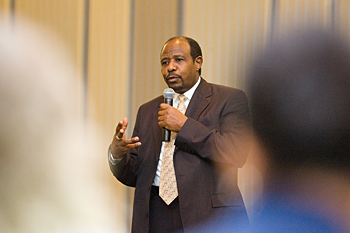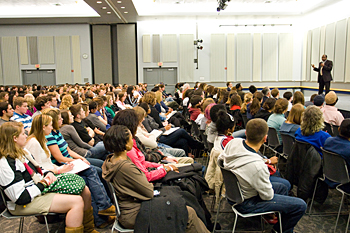
More than 800 students, faculty, staff and community members listened in silence as Rusesabagina described his experiences, from rationing drinking water from the hotel swimming pool to negotiating with military men who were set on watching him kill his own family. He used vivid imagery and the intense details of his experience to move audience members nearly to tears.
Throughout the talk, Rusesabagina emphasized that fact that he never once resorted to physical violence, even in the most trying times when confronted by armed militia. Instead, he chose to fight with words. “Even when it seems hopeless,” he said, “there is always another solution through words, through compromises. Words are the best and worst weapons we have as human beings.”
When asked where he found the courage and determination that made him a leader in such trying times, he explained that the risk was not a consideration. “You don't think of the danger you're putting yourself into while it is all happening,” he said. “You just do what you know is right. I would have been a prisoner of my own conscience if I had left others to die while I saved only myself.”
Rusesabagina concluded his talk with a message to today's younger generation: “You are the ones who can shape the world. Tomorrow is yours. Make it the way you want it to be.” He said he hopes that his story will inspire others, especially younger generations, to raise awareness of violence as a constant and growing problem in today's world. He urged individuals to sign petitions and write letters to demand action from our nation's leaders in current conflicts such as the Darfur genocide.Besides speaking to audiences around the world, Rusesabagina has written his story into an autobiography, An Ordinary Man. Rusesabagina also founded the Hotel Rwanda Rusesabagina Foundation, an organization that provides financial assistance for women and children affected by genocide in Rwanda and other African nations.
Article by Nicolette Blubaugh, AS '08
Photo by Kevin Quinlan


